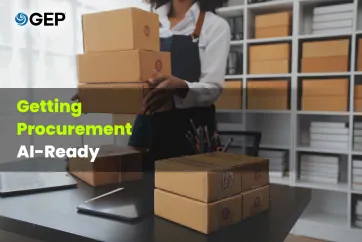
What Are Autonomous Negotiation Agents? (And How They Can Benefit Procurement)
- Autonomous negotiation agents can automate routine supplier negotiations with speed, scale and consistency.
- Trained on historical transactions and supplier behaviors, these AI-powered agents are defining a new work model for procurement, unlocking savings and reducing manual workload in the process.
- By offloading repetitive deals to AI, procurement teams can reclaim time for strategic work like risk management and supplier innovation.
June 18, 2025 | Technology 5 minutes read
Procurement teams spend a lot of time negotiating pricing and payment terms with vendors. Are all these negotiations worth the time and effort? What if many of these small, routine negotiations and deals could be automated?
Historically, these deals have slipped through the cracks. Procurement teams often do not have sufficient resources, or they don’t see enough ROI in chasing minor cost differences across fragmented purchases.
But now, these cracks are being filled by autonomous negotiation agents.
How Autonomous Agents Work
Autonomous negotiation agents are AI-powered systems that engage in supplier negotiations on behalf of human teams. Within procurement-defined rules and constraints, they can initiate, conduct and close deal discussions, all without human intervention. Compared to their human counterparts, they are more efficient and stay within the defined pricing guidelines.
These agents don’t rely on gut instinct or charm. They rely on data. Trained on historical transactions, supplier behaviors, market pricing and contract terms, they approach negotiations with a level of precision that’s nearly impossible to achieve at scale using manual processes.
And procurement organizations are taking notice.
The ROI of Letting Go
Procurement has long been a relationship-driven function where teams use their soft skills and strategic thinking. But not all negotiations are strategic. In fact, most aren’t.
A large percentage of procurement negotiations are rule-based, transactional and repeatable. These are ideal candidates for automation. Autonomous agents can handle tail spend categories, catalog purchases, spot buys and renewals of standardized contracts.
The benefits for your business are clear:
• Speed
What once took days or weeks of emails and meetings can now be concluded in minutes.
• Savings
AI agents can spot price discrepancies, volume discounts or compliance issues that human buyers may overlook — especially in high-volume, low-attention areas.
• Consistency
No more negotiation outcomes varying wildly by region, buyer experience or time pressure. The agent enforces rules evenly across the board.
• Productivity
Procurement professionals can stop chasing pennies and focus on strategic initiatives like supplier innovation, risk mitigation and ESG alignment.
In essence, autonomous negotiation agents free up talent by offloading the grind.
Also Read: Supplier Relationship Management Guide
Talk to our Expert – Contact Us
More Than Just Bots — These Agents Learn
Autonomous agents aren’t rules-based “if-this-then-that” bots. Their reasoning stems from large language models and advanced decision engines that let them think through multi-variable scenarios, understand counteroffers and learn from past negotiation outcomes to improve future performance.
Some can even simulate negotiation tactics by mirroring traits like assertiveness, cooperativeness or concession strategies, depending on the context. And they don’t negotiate outside the guardrails you set. Procurement leaders retain control over objectives, limits and escalation criteria.
These agents are less about replacing buyers and more about extending them. They operate as scalable extensions of procurement teams, bringing discipline and data to deal-making, at scale.
Procurement’s New Role: From Negotiator to Orchestrator
As autonomous agents take over high-frequency, low-complexity deals, the role of procurement will evolve.
Instead of jumping into every negotiation, procurement pros can set the rules of engagement: acceptable price ranges, preferred terms and escalation triggers. They can also focus on analyzing agent outcomes to identify patterns, like which suppliers push back, where savings are coming from, or which categories are most ripe for automation.
This shift mirrors transformations happening across other functions. Just as marketing teams use automation to personalize campaigns at scale, and finance teams use algorithms to flag anomalies, procurement is becoming more strategic: more about orchestration than execution.
It's a move from tactical to transformative.
Where Autonomous Negotiation Agents Can Make an Impact
There are many use cases for autonomous negotiation agents across procurement, especially in scenarios where negotiations are high-frequency, data-driven and rules-based.
For instance: a global manufacturing company that sources logistics services from dozens of regional carriers. Each quarter, the procurement team needs to renegotiate rates based on fluctuating fuel prices and shipping volumes. Instead of spending weeks managing these repetitive discussions, autonomous agents could handle them in hours, applying standardized logic to find optimal rates, flag outliers and ensure compliance with pre-approved terms.
A healthcare organization could deploy agents to manage renewals for non-critical service contracts, such as janitorial or maintenance agreements. With clear thresholds and fallback clauses in place, the agents could ensure timely renewals while freeing up procurement staff to focus on more strategic supplier relationships.
Even mid-sized companies are likely to benefit. A regional retailer, for instance, might use agents to handle spot buys for fast-moving consumables — where prices shift often, but spend is relatively low. The agents would be able to detect pricing changes, trigger renegotiation and lock in discounts faster than any human team could react.
These examples highlight the practical, incremental ways autonomous agents could extend procurement capacity without replacing the strategic judgment of human buyers.
Challenges (and What to Watch)
No technology comes without caveats. Autonomous negotiation agents work best when they have clear rules, clean data and well-defined objectives. Poorly configured agents can lead to missed opportunities or, even worse, strained supplier relationships.
Buy-in is another hurdle. Suppliers may hesitate to negotiate with a bot, especially in industries where relationships matter deeply. Transparency about the use of AI, clear communication and fallback to human oversight are key to maintaining trust.
Finally, there’s governance. How do you monitor negotiation behavior at scale? What guardrails ensure fairness, compliance and alignment with company values?
Procurement leaders must treat these systems not as plug-and-play tools, but as strategic assets that require ongoing management, performance reviews and ethical oversight.
A Key Part of Your Procurement Tech Stack
Adoption is still in the early stages, but momentum is growing. As AI technologies mature and procurement teams grow more comfortable with automation, autonomous negotiation agents are likely to become a core component of the digital procurement stack.
Autonomous agents aren’t here to take your job. They’re here to take parts of it that were never worth your time.
In doing so, they’re enabling procurement to become a true strategic partner in the business: not just a negotiator, but an orchestrator of value.



